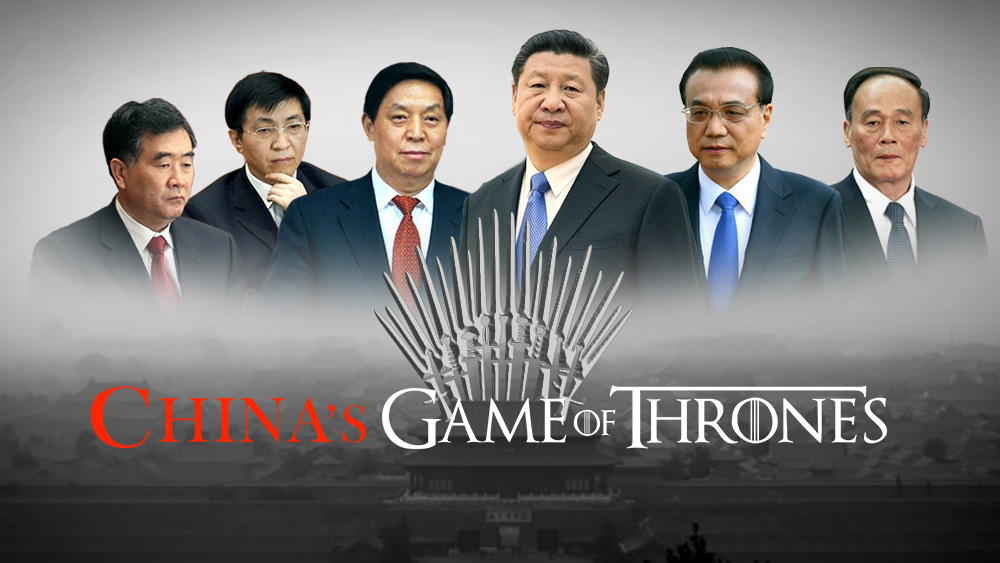◎ Xi may be seeking several outcomes at the 19th Congress.
Contact us for the full report.
PREFACE
In China’s one-party dictatorship, the Politburo Standing Committee and the Politburo determine key policies which affect 1.4 billion Chinese and the world’s second largest economy. As the Politburo and its Standing Committee hold immense sway over China’s future, various Chinese Communist Party (CCP) factions use all possible means to get their chosen candidates into those core-decision making bodies at the five-yearly Party Congress.
The factional struggle over personnel appointments at 19th Party Congress on Oct. 18, however, seems to be more complex and unpredictable when compared to the 18th Party Congress in 2012. This is reflective of the struggle between Xi Jinping and the Jiang Zemin faction reaching a critical juncture, and both sides need to get trusted allies into the Politburo and its Standing Committee at the 19th Congress to stave off elimination over the next five years.
Xi may be seeking several outcomes at the 19th Congress:
- Add “Xi Jinping Thought” or some other formulation of his political theory into the CCP constitution.
- Keep Wang Qishan in office.
- Promote as many trusted officials as possible into top positions while marginalizing Jiang faction members.
- Abolish the Standing Committee system in favor of a CCP Chairman system and an enlarged Politburo.
Xi’s achievements at the Congress will serve as a benchmark of his current political clout, and offer insight into his ability to carry out reform over the next five years.
1. Current Politburo and Standing Committee Status
Some noteworthy points about the current Politburo and its Standing Committee:
- Going by retirement norms set by Jiang Zemin, members of the Politburo and its Standing Committee older than 68 must retire at the Party Congress.
- In the current 7-member Standing Committee, only Xi Jinping and Li Keqiang are young enough to stay in office.
- Whether or not the 69-year-old Wang Qishan gets another five-year term is the biggest uncertainty at the 19th Congress.
- Aside from the seven Standing Committee members, the Politburo has 18 other members. If Xi keeps the Standing Committee system, the incoming Standing Committee will partly comprise of Politburo members who make the cut at the 19th Congress.
- Only 10 out of 18 serving Politburo members are eligible for the Standing Committee.
- Six have reached retirement age.
- Chongqing Party secretary Sun Zhengcai was expelled from the CCP
- Central Military Commission deputy chairman Xu Qiliang is ineligible because CCP norms forbid military personnel from serving on the Standing Committee.
- Three of the 10 eligible Politburo members—Sun Chunlan, Liu Qibao, Zhang Chunxian—belong to the Jiang faction. All three received negative attention while in office and stand little chance of being picked for the Standing Committee. Whether they will remain in the Politburo is also uncertain.
- Politburo members who have a shot at moving up to the Standing Committee include: Li Yuanchao, Han Zheng, Wang Yang, Hu Chunhua, Zhao Leji, Li Zhanshu, and Wang Huning.
- If Xi Jinping has sufficient political power and is successful in negotiating with other CCP influentials, he may break CCP norms and elevate officials he trusts into the Standing Committee, even if these officials are not of appropriate rank.
2. Xi’s two key actions
From Xi’s perspective, he must take two key actions to swing the 19th Congress in his favor:
- Fully consolidate power while resisting interference by Party elders and the collective leadership system.
- Keep close ally Wang Qishan in office to preserve the results of the anti-corruption campaign and maintain its momentum for the next five years.
Meanwhile, Jiang faction officials will do their utmost to prevent Xi from achieving his goals.
3. Five Standing Committee scenarios
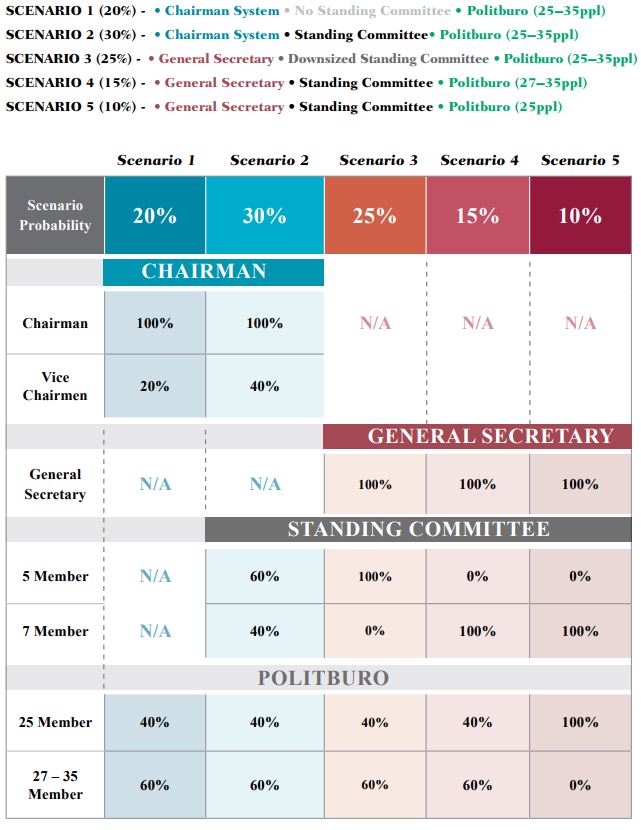
SCENARIO 1— 20% probability
Chairman system, no Standing Committee, Politburo (25~35 members) 
Chairman Only: Xi Jinping
Chairman with Vice Chairs: Xi Jinping (C), Li Keqiang (VC), Wang Qishan (VC)
Wang Qishan Remains (100%)
Key takeaways:
- Scenario 1 is the best possible outcome Xi Jinping can hope to achieve.
- Xi may appoint vice chairmen, but the likelihood isn’t high.
- Two-thirds of the expanded Politburo may consist of officials whom Xi trusts, including the non-elites, or “shuangfei” (not a full or alternate member of the 18th Central Committee) whom Xi has been promoting since taking office.
- This scenario allows Xi to bypass the contentious issue of retaining Wang Qishan in the Standing Committee.
- This scenario may be adopted if Xi adds “Xi Jinping Thought” into the CCP constitution.
SCENARIO 2 — 30% probability
Chairman system, Standing Committee, Politburo (25~35 members)
Chairman Only: Xi Jinping
Chairman with Vice Chairs: Xi Jinping (C), Li Keqiang (VC), Wang Qishan (VC)
Wang Qishan Remains (100%)
Key takeaways:
- Scenario 2 will be the result of a compromise between the Xi and Jiang factions:
- Xi sets a high opening price for negotiations by promoting discussion of “Xi Jinping Thought” and abolishing the Standing Committee via leaks to the press.
- Presuming the Jiang faction is still influential, they will have Xi settle for a less ambitious version of his plan.
- Whether the Standing Committee expands or shrinks will depend on Xi’s present political strength and the outcome of his negotiations with the Jiang faction.
- Xi should be willing to compromise on the Standing Committee size and candidates if he is able to implement his Chairman system.
- If Xi appoints Li Keqiang and Wang Qishan as CCP vice chairmen, he can bypass the contentious issue of retaining Wang in the Standing Committee.
- Xi’s personal authority will be weakened if he appoints CCP vice chairmen.
- Scenario 2 may be adopted if Xi adds “Xi Jinping’s new theory of governance, new thought, and new strategy” into the CCP constitution.
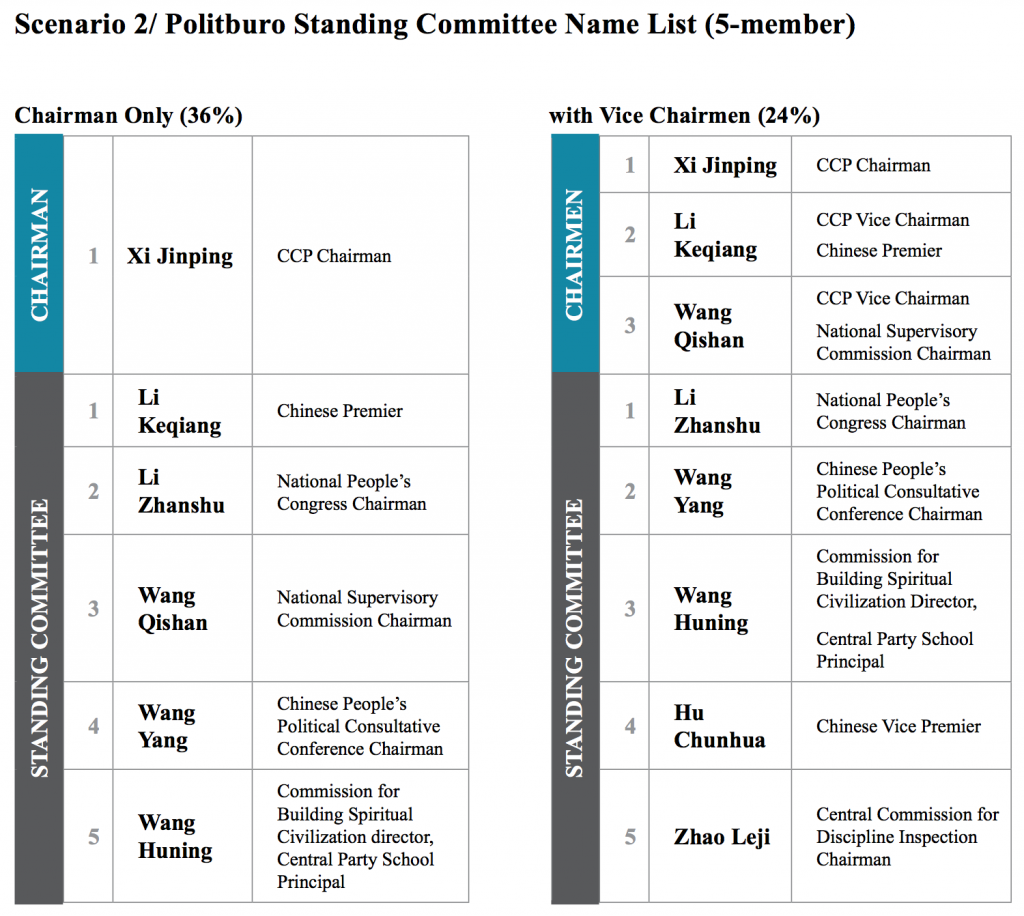
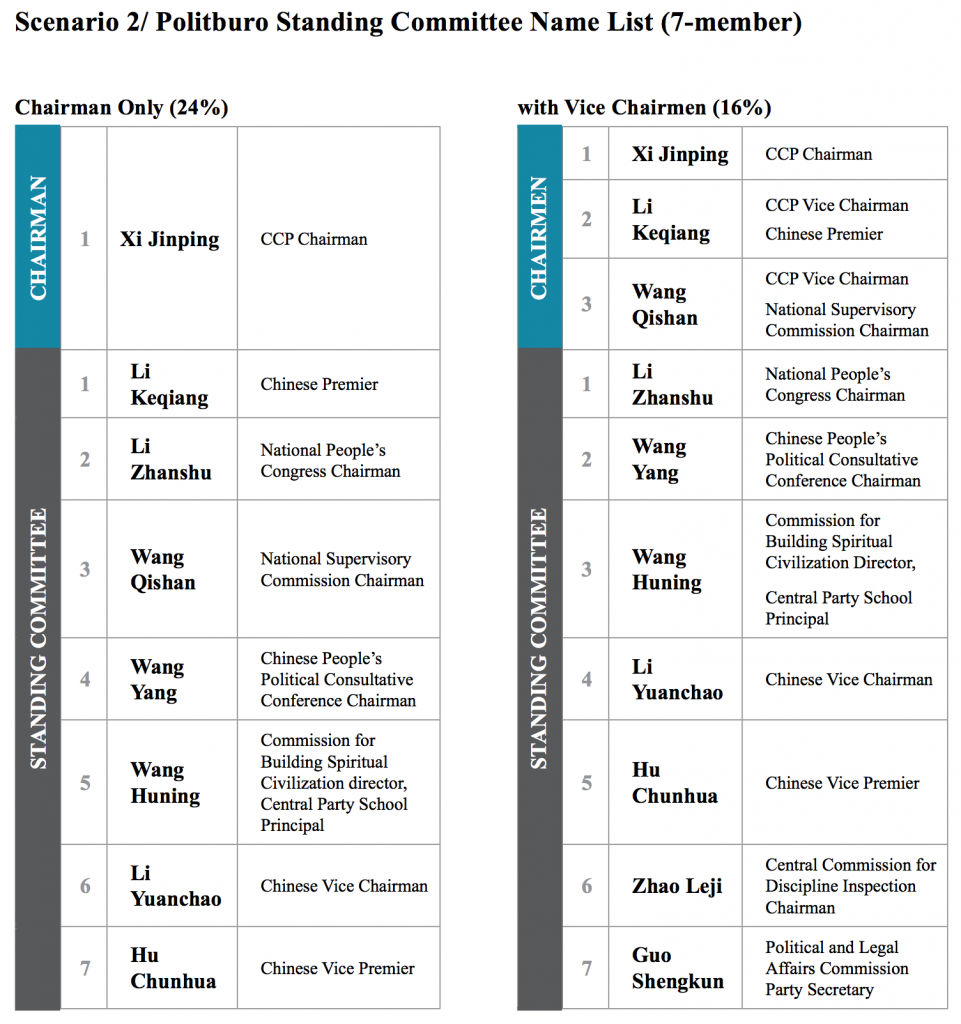
SCENARIO 3 — 25% probability
General Secretary, Politburo Standing Committee (5-member), Politburo (25~35)
General Secretary: Xi Jinping
Wang Qishan Remains(100%)
Key takeaways:
- Scenario 3 will be the result of Xi facing immense resistance against the Chairman system.
- Xi will retain the Standing Committee system, but moves to weaken its influence and boost his personal authority within system.
- Xi may downsize the Standing Committee membership from seven to five and appoint only trusted allies to the body. This arrangement would allow Xi to push through his policies with less resistance.
- Wang Qishan remains in office. Xi may also expand the Politburo and stack it with officials he trusts.
- Scenario 3 may be adopted if Xi adds “Xi Jinping’s new theory of governance, new thought, and new strategy ” into the CCP constitution.

SCENARIO 4 — 15% probability
General Secretary, Standing Committee (7-member), Politburo (27~35)
General Secretary: Xi Jinping
Wang Qishan Remains (60%)
Key takeaways:
- In Scenario 4, Xi retains the Standing Committee system and stacks it with his allies.
- Two-thirds of the expanded Politburo may consist of officials whom Xi trusts.
- There is a chance that Xi wouldn’t be able to keep Wang Qishan in office.
- Scenario 4 may be adopted if Xi adds “Xi Jinping’s new theory of governance, new thought, and new strategy ” into the CCP constitution.
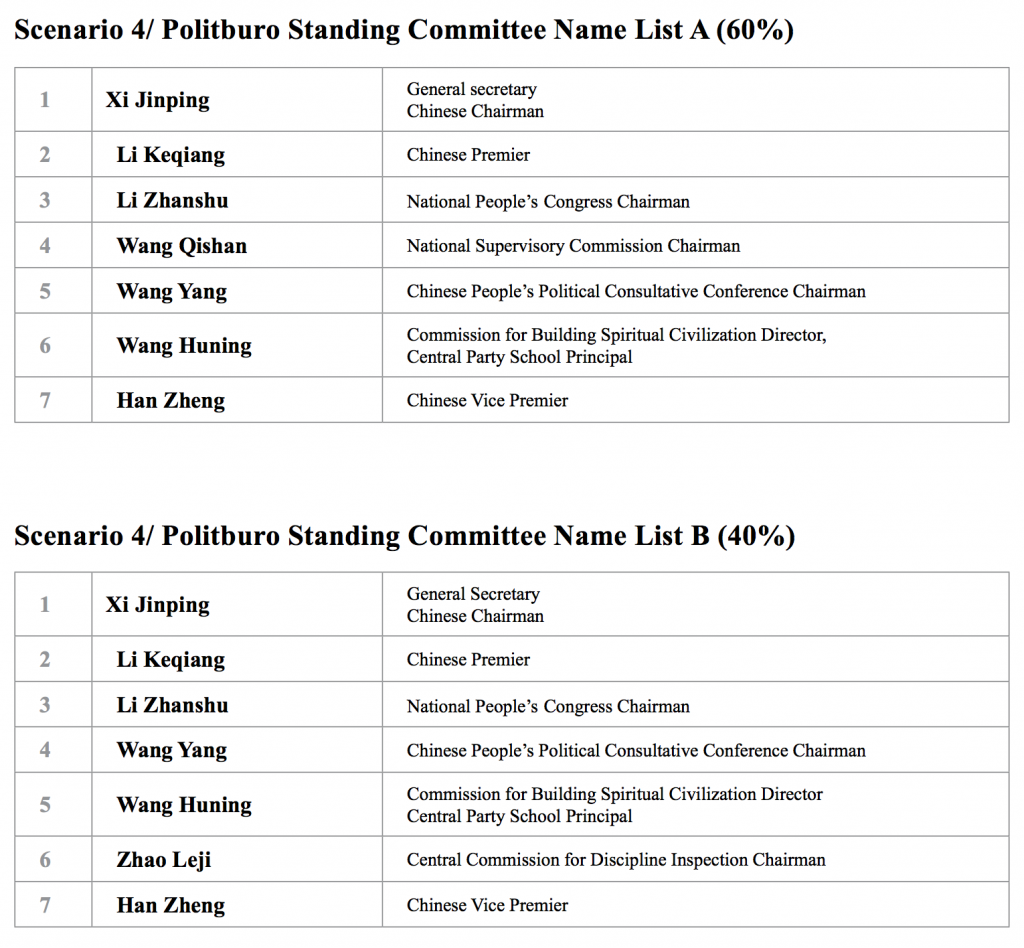
SCENARIO 5— 10% probability
General secretary, Standing Committee (7-member), Politburo (25-member)
General Secretary: Xi Jinping
Wang Qishan: Retires
Key takeaways:
- Scenario 5 is the worst possible outcome for Xi Jinping at the 19th Congress.
- Wang Qishan will retire, and the 18th Congress status quo is kept.
- Xi will have a five very rough years as General Secretary unless he has made unexpected arrangements to reverse this scenario.
- Scenario 5 may be adopted if Xi fails to add anything to the CCP constitution.
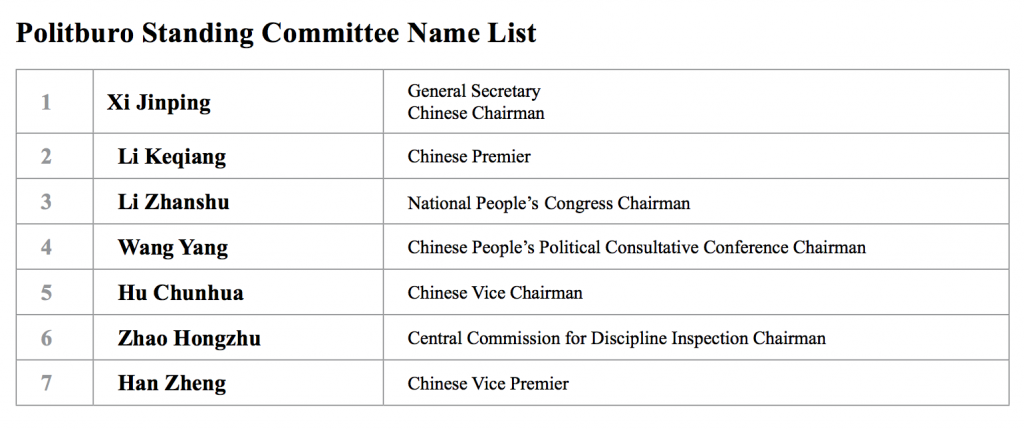
For points 4 and 5, contact us for the full report.
4. Five issues Xi needs to resolve to consolidate power
5. Five moves Xi has used to consolidate power
